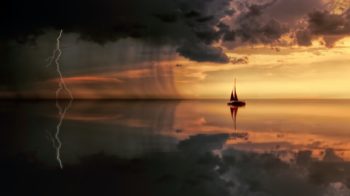Colloquial Spanish Course – Talking about Boats in Spanish Posted by Laura & Adam on Feb 16, 2021 in Learning, Spanish Culture, Spanish Grammar, Spanish Vocabulary
In this Spanish lesson we are going to practice talking about Boats in Spanish. First we will learn some relevant vocabulary and then see if you can follow a short audio conversation in Spanish. The transcript to the audio will be given at the end of the post but please try not to look at it until you have tried playing and understanding the audio a few times.
Talking about Boats in Spanish:
Anchor – Ancla
Astern – Atras
Bilge – Pantoque
Boat – Bote
Boom – Botavara
Bow (ship) – Proa
Bulkhead – Mamparo
Buoy – Boya
Cabin – Camarote
Capstan – Cabrestante
Catamaran – Catamarán
Chart – Carta nautical
Compass – Compas
Deck – Cubierta
Depth – Fondo
Dinghy – Chinchorro
Dock – Dársena
Fishing boat – Pesquero
Flag – Bandera
Harbor – Puerto
Harness – Guarniciones
Hatch – Escotilla
Headland – Punta
Hook – Anzuelo
Hull– Casco
Hydrofoil – Hidroala
Island – Isla
Jib – Foque
Keel – Quilla
Life preservers – Salvavidas
Lifeboat – Bote salvarias
Mainsail – Vela mayor
Marina – Puerto Deportivo
Mast– Mástil, Palo
Motorboat – Lancha Motora
Outrigger – Batanga
Port Side – Babor
Propeller – Helice
Pump – Pomba
Reef – Arrecife
Rocks – Piedras
Rope – Lazo
Rudder – Timon
Schooner – Goleta
Shackle Grillete
Spinnaker – Espinaquer
Starboard – Estribor
Staysail – Vela de estay
Steering Wheel – Volante
Stern – Popa
Swivel – Destorsedor
Tack – Puno de amura
Tide – Marea
Now play the audio to listen a conversation. Can you understand what is being said? Play the audio a few times before you look at the transcript. Don’t worry if you don’t understand every single thing the two people are saying. Try to catch whichever words you can and then try to piece things together to work out what is being said.
(Play the audio a few times before you scroll down and look at the transcript)
Transcript:
Aitana: Hola Douglas, ¿cómo estás?
Douglas: Estoy bien ¿y tú?
Aitana: Estoy bien gracias. Pero me pasó algo el fin de semana.
Douglas: ¿Qué te pasó?
Aitana: Casi me muero.
Douglas: ¡¿Qué?! ¿Dónde? ¿Cómo?
Aitana: Mar adentro en el barco de mi familia, por la costa de Bilbao.
Douglas: ¿Estabas sola? ¿Eres buena marinera?
Aitana: Estaba con mi hermano, su amigo y mi amiga Elena. Todos somos marineros bastante experimentados.
Douglas: Entonces, ¿qué pasó?
Aitana: Quedamos atrapados en una fuerte tormenta. El barco se volcó por el lado de babor y el mástil se sumergió completamente en el agua.
Douglas: ¡Dios mío! Eso suena aterrador.
Aitana: Había enormes olas por todos lados y estábamos más o menos colgados de la cubierta. Aparte del amigo de mi hermano, que estaba en el camarote vomitando.
Douglas: Supongo que todos teníais salvavidas.
Aitana: Por supuesto.
Douglas: ¡Qué miedo!
Aitana: Fue muy difícil levantar la vela mayor y empujar el barco hacia estribor. El viento soplaba muy fuerte. Y nos dirigíamos hacia las rocas.
Douglas: ¿Tu barco no tiene motor?
Aitana: No, es un velero. Teníamos un bote de repuesto, pero habría sido peor si nos hubiéramos montado en el bote.
Douglas: Bueno, estás aquí para contarlo. Entonces, ¿cómo regresaste a la orilla?
Aitana: Finalmente logramos levantar el mástil y la vela y enderezar el casco. No sé cómo, pero lo hicimos. Regresamos al puerto deportivo después de unas cuatro horas de lucha.
Douglas: Estoy tan contento de que estés bien Aitana. Ten cuidado en el futuro.
So, how did you get on? How much did you understand of the listening? Please let me know in the comments section below…
Don’t worry if you didn’t understand that much, keep reviewing the vocabulary and phrases and you will soon be up to speed and ready for the next lesson in this course. See you next time!

Build vocabulary, practice pronunciation, and more with Transparent Language Online. Available anytime, anywhere, on any device.




